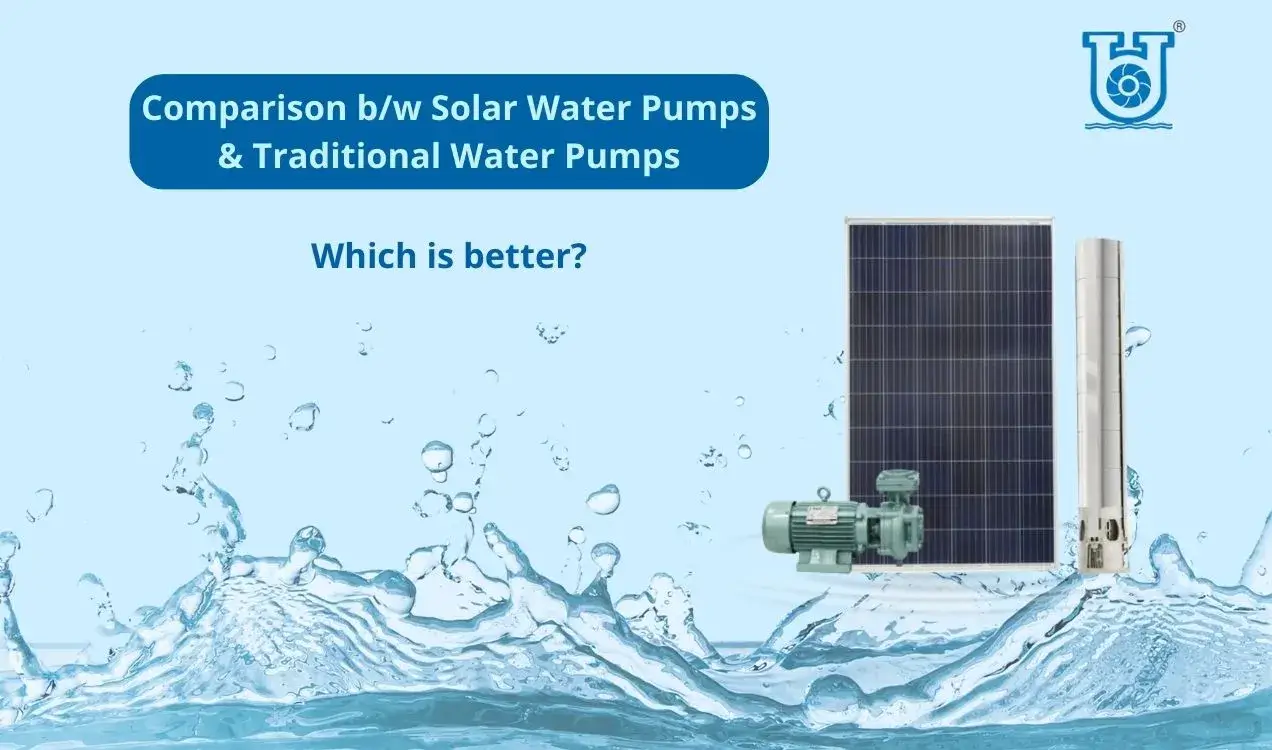Water pumps are a necessity for drinking water, irrigating crops, and moving water to remote locations. Water pumps driven by solar energy are becoming more and more widespread, while standard electric pumps have long been the chosen choice for many years. The benefits and downsides of solar water pumps compared to normal pumps will be covered in this article. Choosing the right option for you requires careful consideration.
Advantages and Disadvantages of pumps
A. Advantages of Solar Water Pumps
Solar water pumps are powered by solar panels, which mean that once you have the panel, all the energy it requires comes from the sun and is absolutely free. This is a big benefit over fossil fuel injectors, which need you to constantly buy fuel. Solar water pumps provide long-term cost savings due to their low care and staff needs. They are also environmentally helpful and safe since they utilise natural energy and do not cause toxic fumes.
B. Disadvantages of Solar Water Pumps
Since you have to buy the water pump and panels all at once, some producers may find the initial cost of solar water pumps to be a barrier. On the other hand, due to their dependency on daylight, solar water pumps are unable to carry water in the case of adverse weather or darkness.
C. Advantages of Traditional Pumps
Traditional pumps are less costly upfront than solar pumps. They are also dependable in any light scenario since they do not rely on sunlight to work. Traditional pumps can offer consistent and reliable water flow, even in the case of a power failure.
D. Disadvantages of Traditional Pumps
Traditional pumps need power or fuel to run, which may result in expensive energy bills. They can have an environmental impact, since they may emit harmful vapours according to the kind of fuel utilised. Traditional compressors are not secure and do not utilise renewable energy. Traditional pumps frequently require expert maintenance, which may be time-consuming and costly.
Costs and Benefits
A. Cost Comparison
When it comes to initial costs, ordinary pumps are typically less costly than solar pumps. However, solar pumps may yield considerable savings in the long term. Traditional pumps need power to run, which may result in significant energy bills. In contrast, solar pumps utilise energy from the sun, which is free 365 days of the year. Once installed, solar pumps need low maintenance, which turns into long-term cost benefits. It’s a good idea to evaluate how long you will want your water pump to survive and calculate the cost of fuel and maintenance during this time. You will be shocked to realise how swiftly what you spend on gasoline adds up and, thus, the savings you will earn!
B. Environmental Impact
Solar water pumps are ecologically helpful and sustainable since they utilise natural energy and do not cause dangerous pollutants. They do not emit dangerous vapours, which keep the air and soil on your farm clean. Traditional pumps, on the other hand, might emit harmful vapours dependent on the kind of petroleum utilised. Traditional compressors are not secure and do not utilise renewable energy. They may affect air and water supplies, depending on the kind of fuel utilised. Solar water pumps are a more safe and ecologically friendly solution, making them a better choice for individuals who value environmentally sympathetic energy sources.
Suitability for Different Scenarios
A. Factors impacting the choice
Solar water pumps are great for less water consumption since they are more cost-effective in the long run owing to zero power costs and long-term savings. They are also excellent for sunny geographic places, where they can perform smoothly. However, the early fees may provide a problem for individuals with economic restrictions.
B. Customizability and freedom
Solar water turbines may be customised to fit unique needs, and their ease of installation and maintenance makes them a good solution for rural or off-grid sites. Traditional pumps, although suited for large water demands, may require expert installation and are more reliant on grid connections, making them less versatile for specific scenarios.
Did you find this information helpful? Find more similar blog : Centrifugal Pumps vs. Reciprocating Pumps: Which one is superior?
How to Choose Between Solar Water Pumps and Traditional Pumps for Your Water Needs
When picking between solar water pumps and normal pumps for your water needs, consider the following factors:
- Water needs: Solar pumps are optimum for reduced water requirements, whereas regular pumps may be suitable for large water demands.
- Geographic location: Solar pumps are ideal for open regions, whereas conventional pumps may be better appropriate for situations with little sunlight.
- Budget constraints: Consider the upfront costs and long-term savings of each alternative to select the ideal suit for your budget.
Additionally, assess the environmental impact, stability, ease of installation, and maintenance requirements of each pump to make an informed decision based on your unique demands and circumstances.
Wrapping Up
In conclusion, the decision between solar water pumps and conventional pumps rests on individual aims, physical area, water needs, and cash. Solar pumps are perfect for individuals valuing ecologically beneficial energy sources, with low water usage, and in open settings. Conversely, ordinary pumps may be more suitable for large water demand, places with little sunlight, or pricing constraints. By methodically evaluating these aspects, you may pick the most suited water pump for your individual needs.


